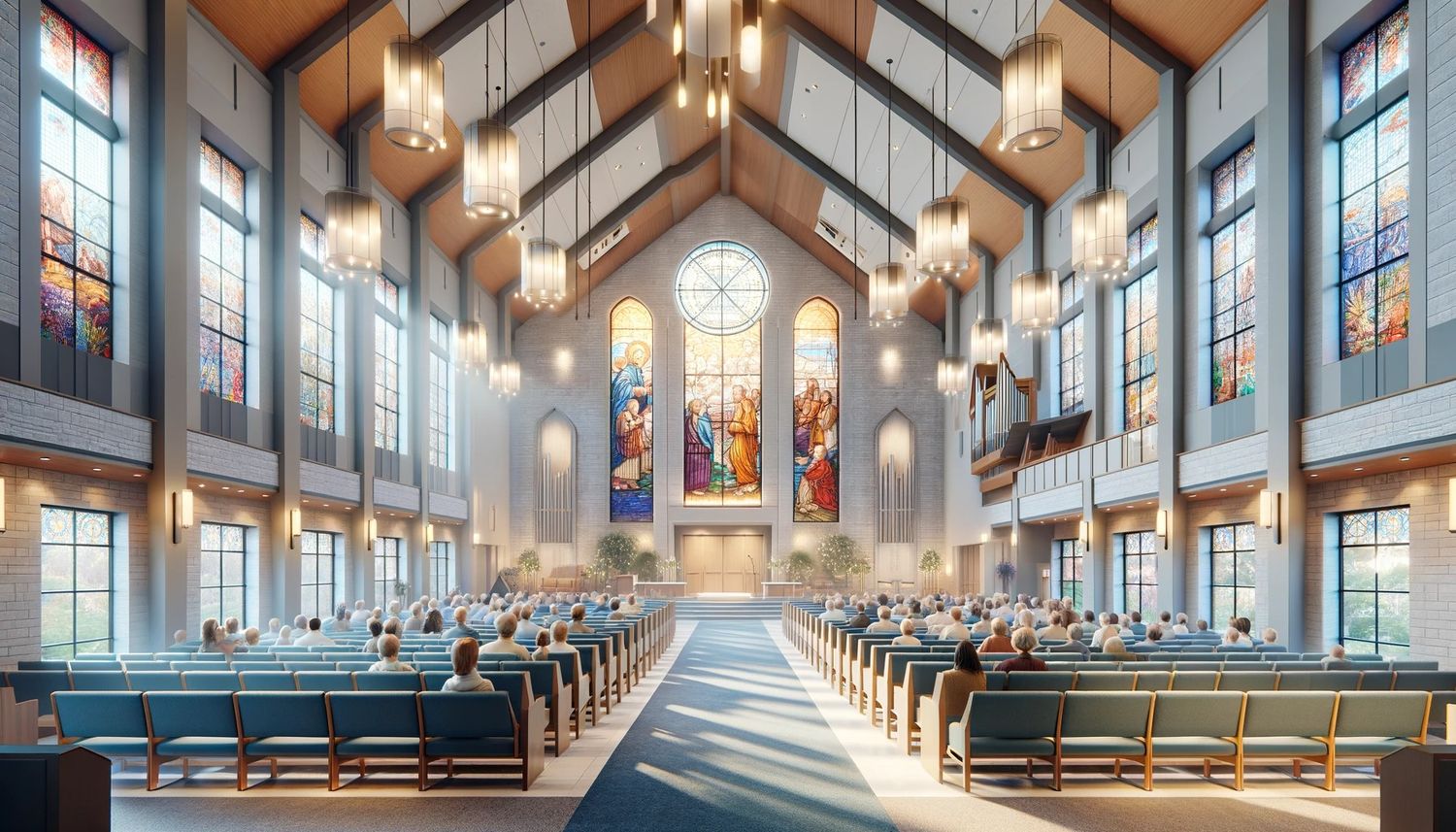Home>Theology and Spirituality>What Is The Evangelical Lutheran Church


Theology and Spirituality
What Is The Evangelical Lutheran Church
Published: March 3, 2024
Peter Smith, Editorial Director at Christian.net, combines deep insights into faith, politics, and culture to lead content creation that resonates widely. Awarded for his contributions to religious discourse, he previously headed a major organization for religious communicators, enhancing dialogue on faith's societal impacts.
Discover the theology and spirituality of the Evangelical Lutheran Church. Learn about its beliefs, practices, and impact on the Christian faith.
(Many of the links in this article redirect to a specific reviewed product. Your purchase of these products through affiliate links helps to generate commission for Christian.net, at no extra cost. Learn more)
Table of Contents
History of the Evangelical Lutheran Church
The Evangelical Lutheran Church has a rich and diverse history that dates back to the Protestant Reformation in the 16th century. Here's a detailed look at the history of the Evangelical Lutheran Church:
-
Roots in the Reformation: The roots of the Evangelical Lutheran Church can be traced back to the 16th-century Protestant Reformation, which was sparked by Martin Luther's 95 Theses in 1517. Luther's teachings and writings laid the foundation for what would become the Lutheran tradition.
-
Formation of Lutheran Churches: Following the Reformation, Lutheran churches began to form in various parts of Europe, particularly in Germany and Scandinavia. These churches were characterized by their adherence to the teachings of Martin Luther and their emphasis on the authority of the Bible.
-
Spread to North America: The Lutheran tradition was brought to North America by European immigrants in the 17th and 18th centuries. The first Lutheran congregations in the United States were established by settlers from Germany and Scandinavia, and the tradition continued to grow and evolve in the New World.
-
Denominational Development: Over time, various Lutheran denominations emerged in North America, each with its own distinct theological emphases and cultural influences. These denominations included the Evangelical Lutheran Church in America (ELCA), the Lutheran Church-Missouri Synod (LCMS), and the Wisconsin Evangelical Lutheran Synod (WELS), among others.
-
Ecumenical Relations: In the 20th and 21st centuries, the Evangelical Lutheran Church has been actively engaged in ecumenical dialogue and cooperation with other Christian traditions. This has led to significant agreements and partnerships with other denominations, fostering greater unity and understanding within the broader Christian community.
-
Contemporary Context: Today, the Evangelical Lutheran Church continues to be a vibrant and diverse tradition, with a global presence and a commitment to social justice, mission work, and theological education. The history of the Evangelical Lutheran Church is a testament to its resilience, adaptability, and enduring commitment to the gospel of Jesus Christ.
Read more: What Is The Lutheran Church
Beliefs and Practices of the Evangelical Lutheran Church
The Evangelical Lutheran Church is grounded in a set of core beliefs and practices that shape its identity and guide the faith and life of its members. Here's an in-depth exploration of the beliefs and practices of the Evangelical Lutheran Church:
1. Justification by Grace through Faith
Central to Lutheran theology is the belief in justification by grace through faith. This core doctrine emphasizes that individuals are justified, or made right with God, not by their own efforts or merits, but solely by God's grace, which is received through faith in Jesus Christ. This understanding underscores the Lutheran commitment to the primacy of God's grace in salvation and the assurance of forgiveness and reconciliation with God through faith.
2. Authority of Scripture
Lutherans affirm the authority of the Bible as the primary source and norm for faith, doctrine, and Christian living. They hold to the belief that the Scriptures bear witness to the living Word of God, Jesus Christ, and are essential for shaping the life and mission of the church. The Evangelical Lutheran Church upholds the importance of studying and interpreting the Bible within the context of the Christian community, guided by the Holy Spirit and in dialogue with tradition and reason.
3. Sacramental Life
The Evangelical Lutheran Church recognizes two sacraments, Baptism and the Eucharist (Holy Communion), as central to its worship and spiritual life. Baptism is seen as the entry into the Christian community and the reception of God's grace, while the Eucharist is celebrated as a means of encountering the real presence of Christ and receiving spiritual nourishment. Lutherans hold a high view of the sacraments as tangible expressions of God's love and promise, and they are integral to the church's worship and identity.
4. The Priesthood of All Believers
Lutherans affirm the priesthood of all believers, which emphasizes the equal dignity and responsibility of all members of the church in their vocation as followers of Christ. This doctrine underscores the belief that all Christians are called to serve God and their neighbors in various capacities, and that ministry is not limited to ordained clergy but extends to the entire community of faith. The Evangelical Lutheran Church values the diverse gifts and contributions of its members in fulfilling the church's mission in the world.
5. Social Justice and Service
In keeping with its commitment to the gospel, the Evangelical Lutheran Church is actively engaged in social justice advocacy and compassionate service to those in need. Grounded in the teachings of Jesus and the prophetic witness of the Hebrew Scriptures, Lutherans strive to address systemic injustices, promote peace and reconciliation, and alleviate suffering through charitable works and community outreach. This emphasis on social responsibility reflects the church's understanding of God's call to love and serve others, especially the marginalized and vulnerable.
6. Liturgical Worship
Lutherans are known for their rich tradition of liturgical worship, characterized by a structured order of service, the use of hymns and liturgical music, and the proclamation of the Word. The Evangelical Lutheran Church values corporate worship as a communal expression of faith, where the gathered assembly participates in prayer, praise, confession, and the hearing of God's Word. Liturgical elements such as the lectionary, sacraments, and liturgical seasons are integral to the church's worship life and spiritual formation.
The beliefs and practices of the Evangelical Lutheran Church reflect its deep theological heritage, its commitment to the proclamation of the gospel, and its dedication to serving the world in Christ's name. These foundational principles shape the faith, worship, and mission of the church, guiding its members in their discipleship and witness to the love and grace of God.
Structure and Leadership of the Evangelical Lutheran Church
The Evangelical Lutheran Church is characterized by a distinctive structure and leadership model that reflects its commitment to shared governance, accountability, and collaborative decision-making. Here's an in-depth look at the structure and leadership of the Evangelical Lutheran Church:
-
Congregational Autonomy: At the local level, individual congregations within the Evangelical Lutheran Church possess a significant degree of autonomy in matters of worship, ministry, and administration. Each congregation is responsible for its own governance, financial management, and pastoral leadership, guided by its own constitution and bylaws. This emphasis on congregational autonomy allows for contextualized expressions of faith and ministry, tailored to the unique needs and demographics of each community.
-
Synodical Structure: The Evangelical Lutheran Church is organized into regional groupings known as synods, which serve as intermediate bodies that connect congregations within a defined geographic area. Synods provide support, resources, and oversight to congregations, facilitate collaborative mission and ministry initiatives, and coordinate the ordination and placement of clergy. The synodical structure fosters interdependence and mutual accountability among congregations, promoting a sense of unity and shared purpose within the broader church body.
-
National Expression: At the national level, the Evangelical Lutheran Church in America (ELCA) serves as the primary administrative and coordinating body for the denomination. The ELCA provides leadership, resources, and strategic direction for the entire church, overseeing mission efforts, theological education, social advocacy, and ecumenical relations. The national expression of the church reflects a commitment to collective decision-making and the pursuit of common goals that transcend regional boundaries.
-
Episcopal Oversight: Within the ELCA, bishops play a crucial role in providing pastoral and administrative oversight at the synodical and national levels. Bishops are elected to serve specific geographical regions and are responsible for shepherding congregations, ordaining clergy, interpreting church policies, and representing the church in public forums. The office of the bishop embodies a ministry of spiritual leadership, discernment, and pastoral care, upholding the unity and mission of the church while respecting the diversity of its members and communities.
-
Clergy and Lay Leadership: The Evangelical Lutheran Church values the shared ministry of clergy and lay leaders in fulfilling the church's mission and nurturing the faith community. Ordained pastors are called to preach, teach, administer the sacraments, and provide pastoral care, while lay leaders contribute their gifts and expertise in areas such as education, outreach, administration, and advocacy. The collaborative partnership between clergy and laity reflects the Lutheran understanding of vocation and the priesthood of all believers, affirming the diverse roles and responsibilities within the body of Christ.
-
Councils and Assemblies: The governance of the Evangelical Lutheran Church involves various councils, assemblies, and committees that deliberate on matters of doctrine, policy, and mission. These bodies provide avenues for dialogue, discernment, and decision-making at different levels of the church's structure, ensuring that diverse voices are heard and that decisions are made in a spirit of consensus and accountability. The participatory nature of these governance structures reflects the Lutheran commitment to transparency, inclusivity, and the discernment of the Holy Spirit's guidance in the life of the church.
The structure and leadership of the Evangelical Lutheran Church embody a balance between local autonomy and interconnectedness, between ordained ministry and the priesthood of all believers, and between tradition and innovation. This model of governance and leadership reflects the Lutheran commitment to the gospel, the well-being of the faith community, and the church's witness in the world.
Read more: What Are The Lutheran Church Beliefs
Mission and Outreach of the Evangelical Lutheran Church
The Evangelical Lutheran Church is deeply committed to mission and outreach, embodying the call to share the love of God, serve others, and proclaim the gospel in word and deed. Here's an in-depth exploration of the mission and outreach efforts of the Evangelical Lutheran Church:
-
Global Mission Partnerships: The Evangelical Lutheran Church engages in global mission partnerships, collaborating with churches and organizations around the world to address humanitarian needs, promote sustainable development, and support communities facing poverty, injustice, and conflict. Through long-term relationships and short-term mission trips, Lutherans participate in cross-cultural exchanges, capacity-building initiatives, and solidarity with global siblings in faith.
-
Disaster Response and Relief: In times of natural disasters, conflicts, and humanitarian crises, the Evangelical Lutheran Church mobilizes its resources and networks to provide immediate relief, long-term recovery, and emotional and spiritual care to affected individuals and communities. Lutherans are actively involved in disaster response efforts, including emergency aid distribution, rebuilding efforts, and trauma counseling, demonstrating a commitment to compassion and solidarity in the face of adversity.
-
Advocacy for Justice and Peace: Grounded in the prophetic tradition of seeking justice and promoting peace, the Evangelical Lutheran Church advocates for systemic change, human rights, and the alleviation of poverty and oppression. Through public policy advocacy, grassroots organizing, and education, Lutherans address issues such as racial equity, immigration reform, environmental stewardship, and economic empowerment, working to transform unjust structures and promote the well-being of all people.
-
Community Engagement and Empowerment: At the local level, Lutheran congregations and affiliated organizations are actively engaged in community outreach, social service programs, and partnerships with local agencies and non-profit organizations. These initiatives address a wide range of needs, including food insecurity, affordable housing, healthcare access, education, and support for vulnerable populations, reflecting the church's commitment to being a tangible presence of hope and compassion in neighborhoods and cities.
-
Mission Education and Discipleship: The Evangelical Lutheran Church prioritizes mission education and discipleship formation, equipping its members, leaders, and congregations with the knowledge, skills, and spiritual grounding needed to engage in mission and outreach effectively. Through resources, training events, and theological reflection, Lutherans are empowered to understand the complexities of mission, engage in interfaith dialogue, and cultivate a missional mindset in their daily lives and ministries.
-
Ecumenical and Interfaith Relations: Recognizing the interconnectedness of the global Christian community and the importance of dialogue and cooperation with people of other faith traditions, the Evangelical Lutheran Church actively participates in ecumenical and interfaith relations. Through partnerships with other Christian denominations, interfaith organizations, and collaborative initiatives, Lutherans seek to build bridges of understanding, work for common goals, and witness to the reconciling love of God in diverse contexts.
The mission and outreach efforts of the Evangelical Lutheran Church reflect its commitment to embodying the love and justice of Christ in a complex and interconnected world. Through global solidarity, compassionate response, advocacy, community empowerment, and interfaith engagement, Lutherans seek to be agents of transformation and reconciliation, bearing witness to the good news of God's kingdom and the inclusive embrace of God's love for all creation.
Diversity and Inclusivity in the Evangelical Lutheran Church
The Evangelical Lutheran Church is deeply committed to embracing and celebrating diversity in its membership, leadership, and ministry, reflecting a vision of inclusivity that affirms the dignity and worth of all individuals. Here's an in-depth exploration of the diversity and inclusivity within the Evangelical Lutheran Church:
-
Welcoming and Affirming Congregations: Many congregations within the Evangelical Lutheran Church have declared themselves as "Reconciling in Christ" or "Welcoming" communities, affirming their commitment to welcoming and including people of all sexual orientations, gender identities, and relationship statuses. This stance reflects the church's acknowledgment of the sacred worth of LGBTQ+ individuals and its rejection of discrimination and exclusion based on sexual orientation or gender identity.
-
Racial and Ethnic Diversity: The Evangelical Lutheran Church is dedicated to fostering racial and ethnic diversity within its congregations, leadership structures, and theological education institutions. Efforts to promote racial equity, multicultural worship, and anti-racism education are integral to the church's commitment to dismantling systemic racism and embracing the richness of diverse cultural expressions within the body of Christ.
-
Gender Equality and Women in Leadership: The Evangelical Lutheran Church affirms the full participation of women in all aspects of church life, including ordained ministry, lay leadership, and decision-making roles. The church has taken significant steps to promote gender equality, address gender-based discrimination, and advocate for the empowerment of women in pastoral ministry, theological education, and organizational leadership.
-
Accessibility and Disability Advocacy: Embracing inclusivity also means ensuring accessibility and accommodation for individuals with disabilities within the life of the church. The Evangelical Lutheran Church is committed to advocating for the rights and dignity of people with disabilities, promoting inclusive worship spaces, and providing resources for disability awareness and support.
-
Interfaith Dialogue and Cooperation: Recognizing the value of engaging with people of diverse religious backgrounds, the Evangelical Lutheran Church actively participates in interfaith dialogue, collaboration, and mutual understanding. Through partnerships with interfaith organizations and initiatives, Lutherans seek to build relationships of respect, cooperation, and shared concern for the well-being of all people, regardless of their religious affiliation.
-
Immigrant and Migrant Advocacy: Given the global nature of migration and displacement, the Evangelical Lutheran Church advocates for the rights and dignity of immigrants, refugees, and migrant communities. The church is engaged in providing support, advocacy, and hospitality to newcomers, addressing issues of immigration reform, and promoting a compassionate response to the needs of those seeking refuge and a better life.
The commitment to diversity and inclusivity within the Evangelical Lutheran Church reflects its understanding of the gospel's call to embrace all people as beloved children of God, created in the divine image. By actively promoting diversity, advocating for justice, and fostering inclusive communities, the church seeks to embody the reconciling and transformative love of Christ in a world marked by difference and division.













